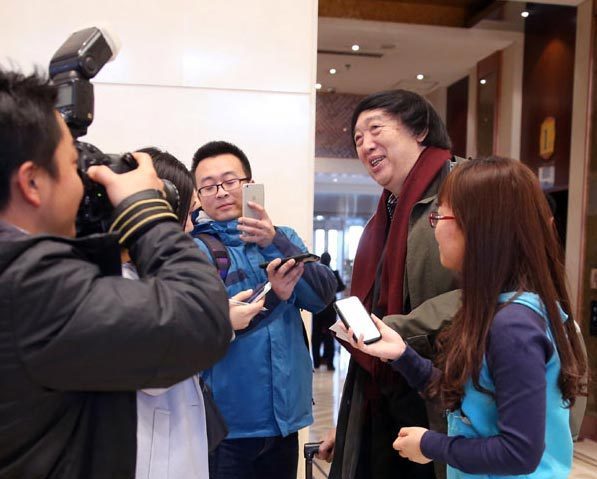当前位置: Language Tips> Focus 专题> 2017全国两会> 新闻
十二届全国政协委员、著名作家冯骥才认为,文化影响人,还是影响人的心灵、人的气质,这才是真正的影响,而不是做几台节目热闹热闹,炒作炒作。
 |
|
Feng Jicai, writer and CPPCC member, is surrounded by reporters as he registers for the annual session March 2, 2015. [Photo by Jiang Dong /China Daily] |
The plenary sessions of the National People's Congress (NPC) and the National Committee of the Chinese People's Political Consultative Conference (CPPCC), popularly known as the two sessions, kicked off recently. Feng Jicai, a famed author, and a CPPCC member, talked to The Beijing News, and shared his views on cultural issues.
两会期间,政协委员、著名作家冯骥才接受了《新京报》的采访,分享了他对几个文化问题的看法。
Learning culture is mainly about experiencing culture
学习文化,最主要是体验文化
1. I know that your proposal this year is about strengthening primary school and middle school students' participation and experience in traditional life and culture. Then in which forms are traditional culture presented?
新京报:你今年的提案是加强中小学生对传统生活文化的参与和体验。传统文化具体有哪些方式?
Feng: Traditional culture is presented in two forms. One is ancient classics, which can be put in textbooks. I remember that when we recited poetry in our childhood, the artistic conception portrayed in the poem was engraved deeply in our minds.
冯骥才:传统文化有两种方式,一种是典籍,这些是文本式的传统文化,这些内容可以进入教材,用教材的方式比较适合。我们小时候背诗,20个字,诗歌深沉的意境就好像刻在骨头里一样。
The other is culture in life. For example, during each Spring Festival, we exclaim that the new year atmosphere is disappearing, and young people are detaching from tradition. If we put Qingming Festival, Duanwu Festival into textbooks, then will young people get more interested in the traditional festivals? It is very important to capture their interest first through education.
还有一种传统文化是生活文化。比如节日,每到春节时,我们会感叹年轻人是不是离传统远了,年味是不是淡了。如果把清明节、端午节,这些节日的习俗编进教材,年轻人不会有兴趣。对中小学生的教育,首先得引起他们的兴趣。
2. So how does one arouse their interest to get closer to traditional culture?
新京报:那怎么引起他们的兴趣,亲近传统文化呢?
Feng: Take an example, the Qingming Festival, which is drawing near. If we put it in a textbook, that will include an introduction to the festival's customs, such as tomb sweeping in memory of the deceased. In ancient times, it was also a festival celebrating the early spring, with people taking spring outings, picking willows, flying kites, and swinging. If you explain this to children, they only know it as a concept without any feeling and experiencing. But if you take children outdoors to experience these things, they will learn to cherish nature and life.
冯骥才:举个简单的例子,马上要清明节了。如果我们要写进课本里,就是清明节的习俗:扫墓,怀念故人;还有古代人亲近春天的意思。踏青、插柳、放风筝、打秋千,很多活动。你给孩子们解释,他们只是概念上知道,没有感觉和亲身体验,老师要带着学生去踏青就不一样了,他们会学会珍惜大自然和生命。
Don't expect the public to love poetry after watching a few TV shows
别指望人们靠几台节目就对诗歌感兴趣
3. The cultural TV shows such as Chinese Poetry Conference and Readers are getting popular these days, have you ever watched the shows?
新京报:最近很火的文化类节目,像《中国诗词大会》、《朗读者》,你有没有看过?
Feng: That's good. While it is only a beginning and an attempt, it can spark people's interests in ancient Chinese poetry on a certain level. Don't expect too much from just a few TV shows. Culture influences people mainly through influencing their souls and temperaments, and not just by making a few TV shows to catch the public's eye.
冯骥才:挺好的,这只是一个开始,一个尝试。可以激起人们对诗词的兴趣。但是也不要指望人们对诗歌的兴趣,靠几台节目就能起到多大作用。文化影响人,还是影响人的心灵、人的气质,这才是真正的影响,而不是做几台节目热闹热闹,炒作炒作。
4. What is the authentic influence of culture?
新京报:什么算是真正的影响?
Feng: As an NPC member, I proposed before that China should set up a Cultural Heritage Day. I know this from France, and each year on this day, all the museums in France are free, and all schools and communities encourage people to get close to cultural heritage.
冯骥才:我之前也写过提案,设立中国文化遗产日(2006年起,每年6月的第二个星期六为中国的“文化遗产日”,新京报记者张维注),就是从法国知道的。他们在那一天,所有博物馆不要钱,所有学校、社区,让人们亲近自己的文化遗产。
I even participated in a poetry reading event in a community in Austria. I was exhibiting my paintings at a house in the suburbs where my Chinese friend was reading poetry, and then local residents also came to read their poetry or perform a folk song, all spontaneously. If people have such cultural self-consciousness, the whole nation's culture and civilization can be activated.
我曾参加过奥地利一个社区的诗歌朗诵会,在萨尔茨堡一个郊区的房子里,我展览我的画,我的中国诗人朋友朗诵诗歌,当地的老头老太太也来朗诵,都是奥地利古代的名诗或当地的民歌,我还看过他们表演民间舞蹈。这些都是全民自发举行的活动。如果全民有这样的文化自觉,我觉得整个社会的文化和文明才会活跃起来。
5. It sounds beautiful. When can we have such cultural self-consciousness?
新京报:听起来很美好。我们什么时候才能有这种文化自觉?
Feng: This will be a long process. We can't forget Chinese culture's roots, but we can absorb the essence of foreign culture. The artistic cultivation of a person needs a slow process which can't be accomplished with quick action.
冯骥才:这是一个长久的过程。我们不能忘了中国文化的本,也要吸收外来的、好的东西。人的艺术修养是一个缓慢的事情,潜移默化,不可能一蹴而就。
6. Will the popular cultural TV shows help?
新京报:热播的文化类节目,会有帮助吗?
Feng: It won't work for all. I know almost all the poetry in the show, so it works a little on me. Some people have little interest in poetry, and the shows won't work on him, either. It's easy to only concentrate on popular things now. However, art and culture have abundant connotations.
冯骥才:不会都起作用。节目里的这些诗词我都知道,可能对我就起不了太大的作用,有些人对诗歌没兴趣,也就没有作用。说白了,我们现在容易起哄。一个东西出来,大家一哄而上都说好,所有人就只关注一件事,不就坏了吗?艺术是有很丰富内涵的。
7. How should we foster the public's cultural self-consciousness?
新京报:那培养文化自觉,应该怎么做?
Feng: I think that to develop traditional culture, one not only needs the opening of national museums, but also needs more opening of private museums. Foundations and people from all walks of life should develop the culture together, to make people have more immaterial pursuits, instead of focusing only on making more money.
冯骥才:我觉得要做传统文化,不仅有国家博物馆的开放,还要有一些热心人士做一些私人博物馆,社会一些基金会做一些公益的事情,各方面应该把社会的文化做起来,让人们有一种丰富的精神追求,而不是赚多少钱,卡里有多少数字。
Culture is fundamentally people-oriented and exists to enrich people's inner mind. People should learn art, and learn to experience life in a beautiful way. Some people have said this is too luxurious. I replied that if we never bring luxury in enjoying the beauty of our culture, then we are being too materialistic.
文化最终还是以人为本,为了人心灵的丰富。人们要学会艺术,就要学会用美的方式,美的感情去感受生活。以前有人听到这句话,说我太奢侈。我说,如果我的民族在美上面从来都没奢侈过,再不奢侈就坏了,我们就太功利了。
中文来源:新京报
英文来源:中国日报网
编辑:丹妮
上一篇 : 企业大佬们的“两会声音”
下一篇 : 王毅外长记者会精彩回答摘录
关注和订阅

电话:8610-84883645
传真:8610-84883500
Email: languagetips@chinadaily.com.cn